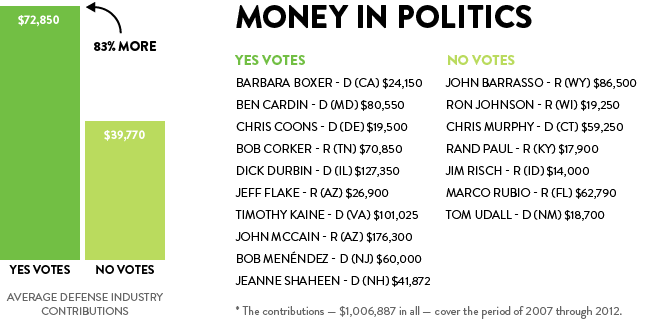
Senators OK with Syria attack got more defense money than those who voted no
By David Kravets
Senators voting Wednesday to authorize a Syria strike received, on average, 83 percent more campaign financing from defense contractors than lawmakers voting against war.
Overall, political action committees and employees from defense and intelligence firms such as Lockheed Martin, Boeing, United Technologies, Honeywell International, and others ponied up $1,006,887 to the 17 members of the Senate Foreign Relations Committee who voted yes or no on the authorization Wednesday, according to an analysis by Maplight, the Berkeley-based nonprofit that performed the inquiry at WIRED’s request.
Committee members who voted to authorize what the resolution called a “limited” strike averaged $72,850 in defense campaign financing from the pot. Committee members who voted against the resolution averaged $39,770, according to the data.
The analysis of contributions from employees and PACs of defense industry interests ranges from 2007 through 2012 — based on data tracked by OpenSecrets.org.
The authorization must be approved by the full Senate and House.
Among other things, the deal sets a 60-day engagement limit, and bars U.S. ground troops from combat missions. The plan essentially is the legal basis to authorize President Barack Obama to punish Syria for allegedly using chemical weapons, killing some 1,400 people as part of its ongoing civil war.
The top three defense-campaign earners who voted “yes” were Sen. John McCain (R-Arizona) at $176,000; Sen. Dick Durbin (D-Illinois) at $127,350; and Sen. Timothy Kaine (D-Virginia) at $101,025.
The top three defense-campaign earners who voted “no” were Sen. John Barrasso (R-Wyoming) at $86,500; Sen. Marco Rubio (R-Florida) at $62,790; and Sen. Chris Murphy (D-Connecticut) at $59,250.
(From Wired)


